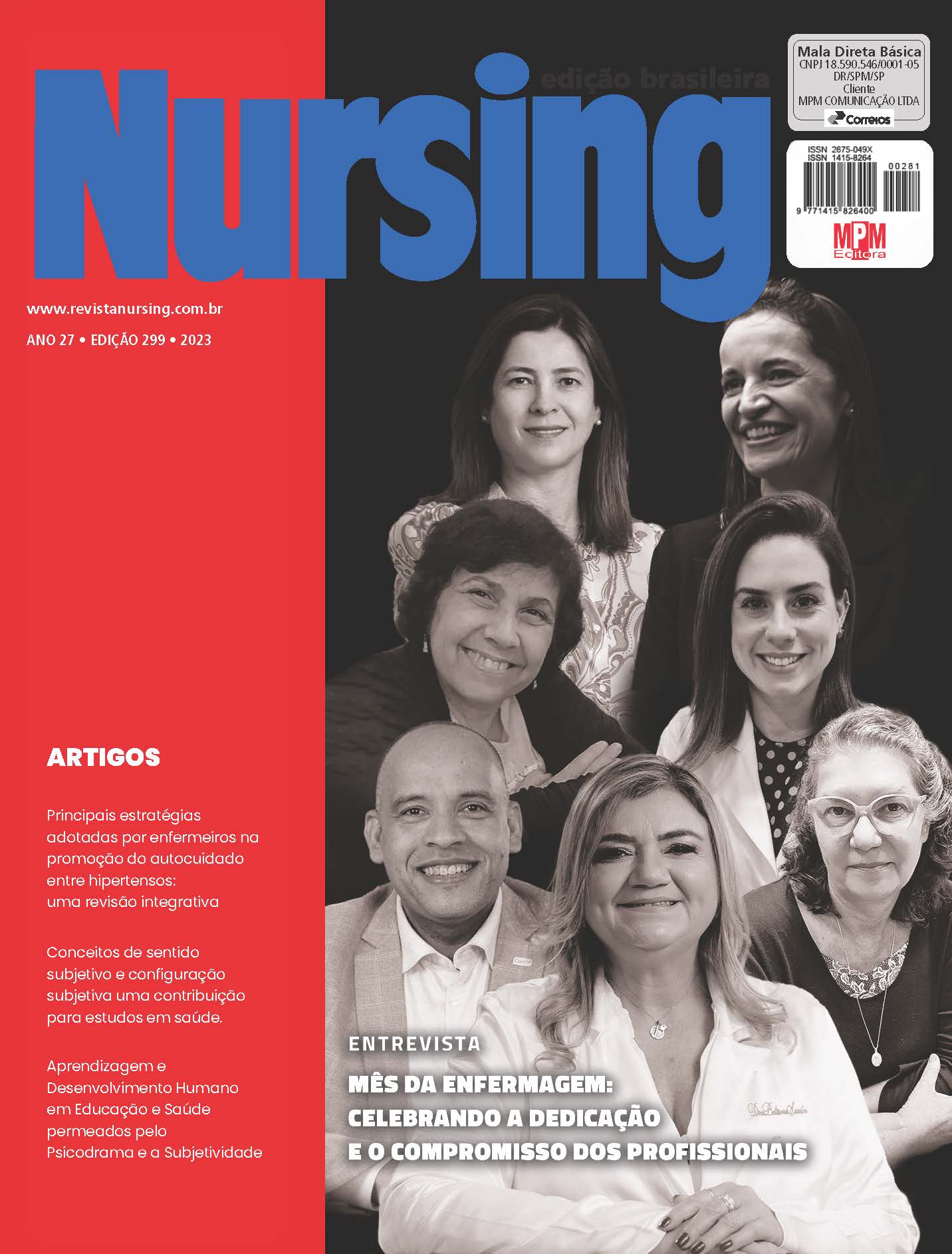Main strategies adopted by nurses in promoting self-care among hypertensive patients: an integrative review
DOI:
https://doi.org/10.36489/nursing.2023v26i299p9570-9576Keywords:
Nursing care, Hypertension, Self-careAbstract
Objective: to analyze national and international scientific publications on the main strategies adopted by nurses to promote self-care in the control of arterial hypertension. Method: This is an integrative literature review based on a search in the PubMed, SciELO, BDENF and LILACS databases, to identify studies published between 2012 and 2022. Results: Eight studies were included in the sample, after selection according to the inclusion and exclusion criteria. Three categories were identified: Health education as a tool for self-care for hypertensive patients; Importance of professional nursing training in self-care for hypertensive patients and home visits as a tool for self-care related to adherence to antihypertensive treatment. Conclusion: Nurses play an important role in promoting self-care among hypertensive patients, mainly through health education and home visits, acting on the main needs identified by them.
References
Malta DC, Silva JJB. O Plano de Ações Estratégicas para o Enfrentamento das Doenças Crônicas Não Transmissíveis no Brasil e a definição das metas globais para o enfrentamento dessas doenças até 2025: uma revisão. Epidemiologia E Serviços de Saúde. 2013;22(1), 151–164. https://doi.org/10.5123/s1679-49742013000100016
Van Truong P, Apriliyasari RW, Lin M, Chiu H, & Tsai P. Effects of self-management programs on blood pressure, self‐efficacy, medication adherence and body mass index in older adults with hypertension: Meta-analysis of randomized controlled trials. International Journal of Nursing Practice. 2021;27(2). https://doi.org/10.1111/ijn.12920
Rabelo LM, Krislayne VA, Celestino MS, Cangirana JF, Andrade K, Maria S, Costa JS. Papel do enfermeiro na prevenção da hipertensão arterial sistêmica em idosos. Revista Brasileira de Pesquisa Em Ciências Da Saúde. 2019;6(12), 22–28. http://revistas.icesp.br/index.php/RBPeCS/article/view/722/756
Park YH, Chang H, Kim J, Kwak JS. Patient-tailored self-management intervention for older adults with hypertension in a nursing home. Journal of Clinical Nursing. 2013. https://doi.org/10.1111/j.1365-2702.2012.04236.x
Malagris L, Alcides A, Teixeira LG, Emely S. Senso de autoeficácia, comportamentos de saúde e adesão ao tratamento em pacientes portadores de diabetes e/ou hipertensão. Revista Brasileira de Terapias Cognitivas. 2020;16(1):06-33. http://pepsic.bvsalud.org/scielo.php?script=sci_arttext&pid=S1808-56872020000100005
Riegel B, Westland H, Iovino P, Barelds I, Bruins SJ, Stawnychy MA, et al. Characteristics of self-care interventions for patients with a chronic condition: A scoping review. International Journal of Nursing Studies. 2020;103713. https://doi.org/10.1016/j.ijnurstu.2020.103713
Cavalcante FML, Oliveira IKM, Campos PM, Sousa FWM, Paiva TS, Barros LM. Teorias de enfermagem utilizadas nos cuidados a hipertensos. Enfermagem Em Foco. 2021;12(2). https://doi.org/10.21675/2357-707X.2021.v12.n2.3392
Delavar F, Pashaeypoor S &Negarandeh R. The effects of self-management education tailored to health literacy on medication adherence and blood pressure control among elderly people with primary hypertension: A randomized controlled trial. Patient Education and Counseling. 2020;103(2), 336–342. doi: https://doi.org/10.1016/j.pec.2019.08.028
Soares F, Nogueira LT, & Mello M. HiperDia: adesão e percepção de usuários acompanhados pela Estratégia Saúde da Família. Rev Rene. 2022;12. http://www.periodicos.ufc.br/rene/article/view/4380
Gholamzadeh A. The Effect of Self Care Education Based on Orem’s Nursing Theory on Quality of Life and Self-Efficacy in Patients with Hypertension: A Quasi-Experimental Study. International Journal of Community Based Nursing and Midwifery. 2020;8(2). https://doi.org/10.30476/IJCBNM.2020.81690.0
Warren-Findlow J., Seymour R. B. Prevalence rates of hypertension self-care activities among African Americans. Journal of the National Medical Association. 2011;103(6):503–512. https://doi.org/10.1016/s0027-9684(15)30365-5.
Sousa LMMS, Marques-Vieira CMA, Severino SS & Antunes AV. Metodologia de revisão integrativa da literatura em enfermagem. Revista Investigação Enfermagem. 2017;(21), 17-26
Souza MT, Silva MD, & Carvalho R. Integrative review: what is it? How to do it? Einstein (São Paulo). 2010;8(1), 102–106. https://doi.org/10.1590/s1679-45082010rw1134
Eriksen MB & Frandsen TF. The impact of patient, intervention, comparison, outcome (PICO) as a search strategy tool on literature search quality: a systematic review. Journal of the Medical Library Association. 2018;106(4). https://doi.org/10.5195/jmla.2018.345
Moher D, Liberati A, Tetzlaff J, Altman DG. Preferred Reporting Items for Systematic Reviews and Meta-Analyses: The PRISMA Statement. PLoS Medicine. 2009;6(7), e1000097. https://doi.org/10.1371/journal.pmed.1000097
Minayo MC. Amostragem e saturação em pesquisa qualitativa: consensos e controvérsias. Revista Pesquisa Qualitativa. 2017;5(7):1–12. https://editora.sepq.org.br/rpq/article/view/82
Pompeo DA, Rossi LA, Galvão CM. Revisão integrativa: etapa inicial do processo de validação de diagnóstico de enfermagem. Acta Paulista de Enfermagem. 2009;22(4):434–8. https://doi.org/10.1590/S0103- 21002009000400014
Girão ALA, Oliveira GYM, Gomes EB, Arruda LP, Freitas CHA. A interação no ensino clínico de enfermagem: reflexos no cuidado à pessoa com hipertensão arterial. Revista de Salud Pública. 2015;17(1), 47–60. https://doi.org/10.15446/rsap.v17n1.47789
Khademian Z, Kazemi AF, Gholamzadeh S. The Effect of Self Care Education Based on Orem’s Nursing Theory on Quality of Life and Self-Efficacy in Patients with Hypertension: A Quasi-Experimental Study. International Journal of Community Based Nursing and Midwifery. 2020;8(2), 140–149. https://doi.org/10.30476/IJCBNM.2020.81690.0
Persell SD, Karmali KN, Lazar D. Friesema EM, Lee JY, Rademaker A, et al. Effect of Electronic Health Record–Based Medication Support and Nurse-Led Medication Therapy Management on Hypertension and Medication Self-management. JAMA Internal Medicine. 2018;178(8), 1069. https://doi.org/10.1001/jamainternmed.2018.2372
Drevenhorn E, Bengtson A, Nyberg P & Kjellgren KI. Assessment of hypertensive patients’ self-care agency after counseling training of nurses. Journal of the American Association of Nurse Practitioners. 2015;27(11), 624–630. https://doi.org/10.1002/2327-6924.12222
Kes D, Polat U. The effect of nurse-led telephone support on adherence to blood pressure control and drug treatment in individuals with primary hypertension: A randomized controlled study. International Journal of Nursing Practice. 2021. https://doi.org/10.1111/ijn.12995
Park E, Kim J. The Impact of a Nurse-Led Home Visitation Program on Hypertension Self-Management among Older Community-Dwelling Koreans. Public Health Nursing. 2015;33(1), 42–52. https://doi.org/10.1111/phn.12220
Miao JH, Wang HS, Liu N. The evaluation of a nurse-led hypertension management model in an urban community healthcare. Medicine. 2020;99(27),e20967. https://doi.org/10.1097/md.0000000000020967
Agena F, Silva GCA &Pierin AMG. Monitorização residencial da pressão arterial: atualidades e papel do enfermeiro. RevEscEnferm USP. 2011;45(1), 258–263. https://doi.org/10.1590/s0080-62342011000100036
Santos GMI, Oliveira SA, Queiroz GDAC, & Veiga EV. Ensino da medida da pressão arterial entre hipertensos: estratégia educativa com simulador de baixa fidelidade. Saúde Coletiva (Barueri). 2021;11(68), 7603–7816. https://doi.org/10.36489/saudecoletiva.2021v11i68p7603-7816
Tan SM, Han E, Quek RYC, Singh SR, Gea‐Sánchez M, &Legido-Quigley H. A systematic review of community nursing interventions focusing on improving outcomes for individuals exhibiting risk factors of cardiovascular disease. Journal of Advanced Nursing. 2019;76(1), 47–61. https://doi.org/10.1111/jan.14218








